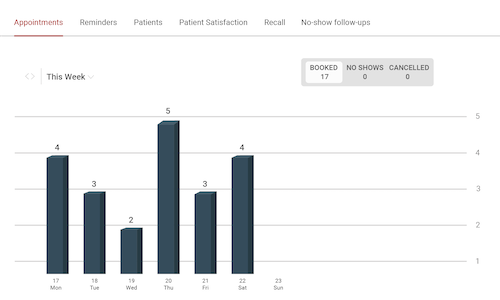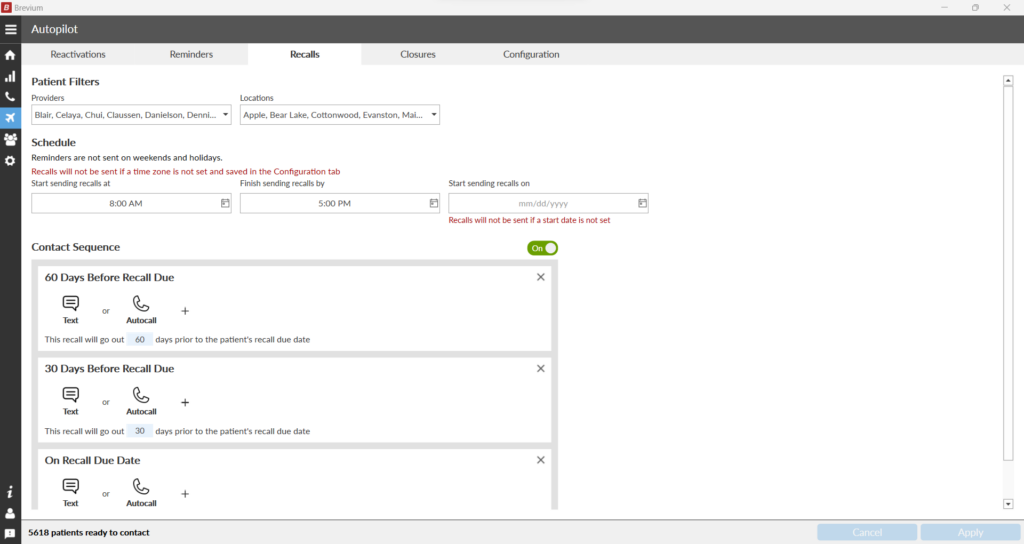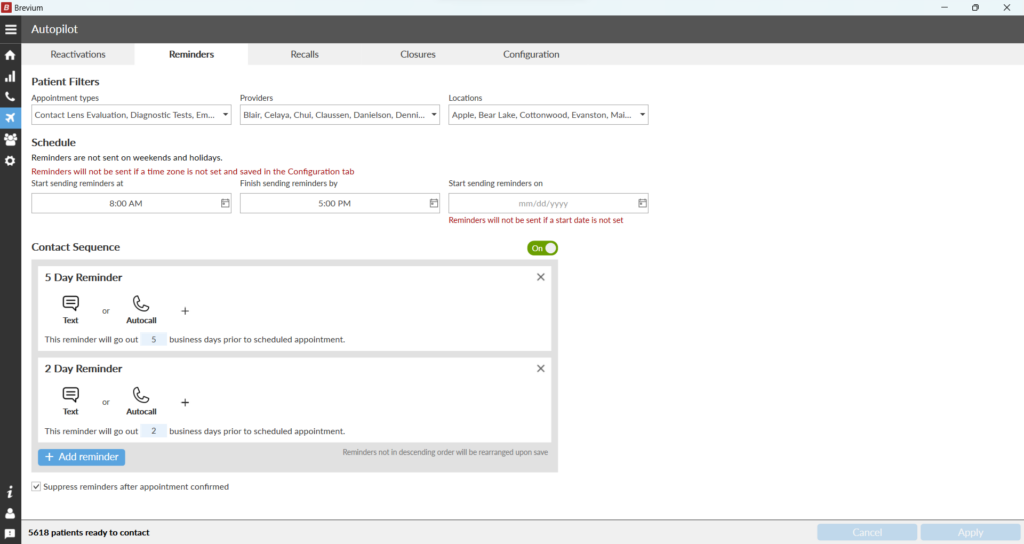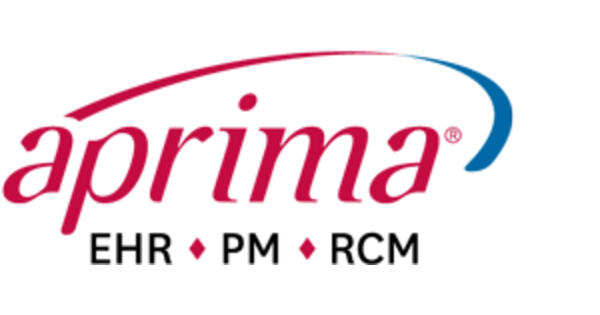Patient Appointment Reminder Software

Recall and Remind Patients
One effective strategy that Brevium uses to boost reactivation efforts is minimizing no-shows and cancellations through proactive recalls and reminders. Encouraging patients to schedule recall appointments before they become lost or overdue can significantly contribute to a more streamlined healthcare process.
Here’s a breakdown:
Methods of Recall:
- Phone Calls: Utilize phone calls to directly communicate with patients, providing a personal touch and allowing for immediate interaction.
- Text Messages: Send automated or personalized text messages as convenient reminders for upcoming appointments or recalls.
- Email Reminders: Use emails to send detailed information about the recall, including instructions and reasons for scheduling a follow-up.
- Postcards: Use traditional reminder postcards to let your patients know they are due for a check-up.
Types of Recalls:
- Routine Check-ups: Schedule regular appointments for preventive care and routine check-ups, ensuring patients stay on track with their health management.
- Diagnostic Tests: Prompt patients to schedule follow-up appointments for diagnostic tests or screenings, maintaining continuity in their healthcare journey.
- Medication Review: Implement recalls for medication reviews, ensuring patients receive timely assessments of their prescribed medications and any necessary adjustments.
- Specialized Care: Tailor recalls for patients requiring specialized care, ensuring they receive timely interventions based on their medical needs.
By leveraging various recall methods like phone calls, text messages, and email reminders, healthcare providers can significantly reduce missed appointments and enhance patient care continuity. Each method, whether it’s a personalized call or an automated text, is tailored to meet different patient preferences and needs, ensuring effective communication.
Recall
Effectively managing patient recall is paramount for healthcare providers, who have the control to determine the number, frequency, and timing of the recalls that patients receive. This ensures they return to the practice at their scheduled time.
Leveraging patient recall software adds a layer of sophistication to this process, utilizing a range of communication methods tailored to patient preferences. These include personalized text messages, automated phone calls (autocalls), and traditional postcards. Each is designed to reach patients due for an appointment and prompt them to schedule with their healthcare providers.


Remind
Brevium’s patient appointment reminder software plays a critical role in mitigating the stress and financial impact of cancellations and no-shows in medical practices. By implementing a multifaceted approach to patient re-engagement, Brevium ensures that patients are effectively returned for their upcoming scheduled appointments. The software utilizes a variety of outreach methods, including texts, autocalls, and postcards, with each one tailored to cater to different patient preferences ensuring maximum reach and response.
Furthermore, Brevium’s software is enhanced by its data-driven patient engagement tools. These tools offer in-depth reporting on all appointments, providing valuable insights into the types of engagement sent, their effectiveness, patient responses, and the current status of each patient. This level of detail allows healthcare providers to analyze and understand the nuances of patient behavior and engagement, leading to more informed decisions about how to communicate effectively with different patient demographics.
For example, the recall software can track whether a text message, autocall, or postcard was more effective in reminding a particular patient group about their appointments. It can also identify patterns in patient responses, such as which type of reminder leads to immediate appointment confirmations or rescheduling. This data not only aids in refining the patient recall strategy but also contributes to a more streamlined and cost-effective practice management.
FAQs
What Exactly Is Patient Recall in the Context of Brevium?
Patient recall is an approach utilized by healthcare practices, like yours, to prompt patients to attend their follow-up appointments. This involves various forms of communication, such as phone calls, text messages, emails, and physical mail like letters or postcards.
Why Should Patient Recall Be a Priority in Your Practice?
Implementing patient recall is crucial for the sustained engagement of your existing patient base. It’s notably more economical to maintain your current patients than to invest in acquiring new ones. Pre-scheduling preventative care appointments is a proactive step, but patients may forget their appointments over time. Here, patient recalls play an essential role – they serve as a reminder for upcoming appointments or as an alert for any appointments that might have been missed.
How Does Patient Recall Benefit Your Practice?
Adopting a recall strategy is an effective way to demonstrate your commitment to patient welfare, which can significantly boost patient retention and satisfaction. By ensuring patients are reminded of their appointments, your practice not only minimizes financial losses due to missed appointments but also guarantees patients receive the necessary care.
Many times even with these tools, patients still miss their appointments or don’t schedule recalls. Unlike other Patient Recall and Reminder systems that end there, Brevium’s powerful Patient Reactivation software targets patients based on disease state, provider, location, and other information you set to reactivate the highest priority patients for the practice. It does this through proven reactivation methods that are only available in Brevium.
What Is a Recall Appointment?
A recall appointment, in the context of healthcare practices like yours, refers to a scheduled visit specifically arranged to monitor or follow up on a patient’s health status. These appointments are typically set for patients who require ongoing care, preventive screenings, or routine check-ups. The purpose of a recall appointment is to ensure patients remain on track with their healthcare management and receive timely interventions when necessary.
How to Start Patient Recall?
Initiating patient recall in your practice involves a strategic approach aimed at reconnecting with patients who may be due for follow-up appointments or preventive screenings. Here are a few ideas to get you started on a general patient recall process:
- Assess Patient Database: Begin by reviewing your patient database to identify individuals who are due for recall appointments based on factors such as last visit dates, medical history, and recommended follow-up timelines.
- Segmentation: Segment your patient population based on various criteria such as disease state, age group or specific healthcare needs. This segmentation allows for targeted communication and personalized recall strategies tailored to each patient group.
- Communication Strategy: Develop a comprehensive communication strategy outlining the methods and channels through which you’ll reach out to patients. Consider utilizing a combination of phone calls, text messages, emails, and traditional mail to maximize reach and response.
- Appointment Scheduling: You’ll want to start by offering flexible options for patients to book their recall appointments. Provide convenient scheduling methods such as online booking portals, phone assistance, or dedicated appointment lines.
- Follow-up and Feedback: Monitor patient responses and engagement with your recall efforts. Follow up with individuals who may require additional assistance in scheduling appointments or have specific concerns. Encourage feedback to continually refine and improve your patient recall approach.
- Evaluate and Adjust: Regularly look at the effectiveness of your patient recall strategy by analyzing key metrics, such as appointment attendance rates, patient feedback, and overall engagement. Use these insights to make adjustments and enhancements to your approach as needed.
The best thing you can do, though, is to let Brevium help you with your patient recall process. By implementing a proactive patient recall process with Brevium, you not only prioritize the health and well-being of your patient population but also strengthen the efficiency and effectiveness of your practice’s healthcare delivery.











